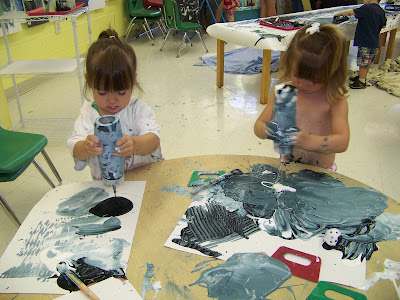 Children developing an Intellectual Disposition...
Children developing an Intellectual Disposition...What is an Intellectual Disposition?
A habit of mind and action, or tendencies to respond to categories of experience across classes of situations.
Engaging Children's Minds by Lilian Katz and Sylvia Chard
p.34
Today I am asking you all to think about what receiving an Education means for you and your children?
When we think of a building, we understand that the base is the foundation for the entire structure. If the base is not strong, the building will eventually collapse.
If we think about our children's education this way, we understand that these beginning years (0-5) are the most critical for strengthening the base onto which a life will be layered on top of.
"Education is not the preparation for life , Education is life!"
John Dewey
Therefore, I hope it makes sense to you that my goals for the Education of your children address strengthening the disposition to: analyze, hypothesize, synthesize, to predict and check predictions, to theorize about cause-effect relationships, the consequences of actions, to be empirical, to strive for accuracy, etc...
p.35 Engaging Children's Minds

 Give them time!! Let them observe!
Give them time!! Let them observe! I say this all the time, mostly to myself and to my husband, concerning our daughter!
But it's so true and today's class was the perfect example!
As his brother jumped right in and rolled the truck in the paint, down the ramp, and across the table, A. (could have this wrong, sorry!) (they are identical twins) carefully and intently observes the situation while staying close to his Mama's side. She gives him a gentle nudge here and there, allowing him to process the thought that he too could be moving the trucks onto the paper.

 He Carefully evaluates the possibilities.
He Carefully evaluates the possibilities.
Perhaps he is gathering an arsenal of ideas from those around himself before deciding what route he might take.
Here is a child who is capitalizing on an opportunity to observe those around him and he values multiple perspectives before entering into the action himself.


 The Daring Duo!!!
The Daring Duo!!!
I have to admit, I run to put down extra sheets when these 2 enter into a collaboration. You see them working separately here but believe you me! They are very aware of each other!
As they squeeze the paint from the bottles, I am surprised to see a beautiful puddle of black paint, which then E. drips white paint on top of. It creates quite a beautiful result and the temptation to swirl, touch, slap, and splatter is irresistible!



 Joyful Learning and all it's glory!
Joyful Learning and all it's glory!
Thank you to the Mommas who embraced the experience as much as their children! They cleaned it up, spotless in the end! And all that's left is a beautiful memory of joyful collaboration in the brains of these 2 amazing little girls!
And of course...the pictures to document!

What is it about children and sand? And water, too?
So many of the children in both my arts and science classes end up here in the sandbox or at the Water table.
I read a great article today: http://www.earlychildhoodnews.com/earlychildhood/article_view.aspx?ArticleID=62
Here's some of my favorite excerpts:
There is no right way to use sand. It invites participation; it permits children to make and test hypotheses; it stretches the imagination; it provides a potentially soothing sensory experience; and it is an excellent avenue for children to learn physical, cognitive, and social skills.
Because sand play is open-ended, the child determines the direction and path of his or her own play. This freedom then clears the way for the child to build developmental concepts.
What Can Children Learn From Playing in Sand?
Sand play promotes physical development. Large muscle skills develop as children dig, pour, sift, scoop, and clean up spills with brush and dustpan. Eye-hand coordination and small muscle control improve as children learn to manipulate sand accessories.
Sand play also promotes social skills. When children work together at the sand table they are faced with real problems that require sharing, compromising, and negotiating. A group may engage in dramatic play as they "cook," construct roadways, dig tunnels, or create a zoo for rubber animals. As children take on roles associated with their dramatic play, they learn important social skills such as empathy and perspective taking.



 Children developing an Intellectual Disposition...
Children developing an Intellectual Disposition...
 Give them time!! Let them observe!
Give them time!! Let them observe! 

 He Carefully evaluates the possibilities.
He Carefully evaluates the possibilities. 

 The Daring Duo!!!
The Daring Duo!!!



 Joyful Learning and all it's glory!
Joyful Learning and all it's glory!




No comments:
Post a Comment